Holding History: Old Media and New Stories in the Archives
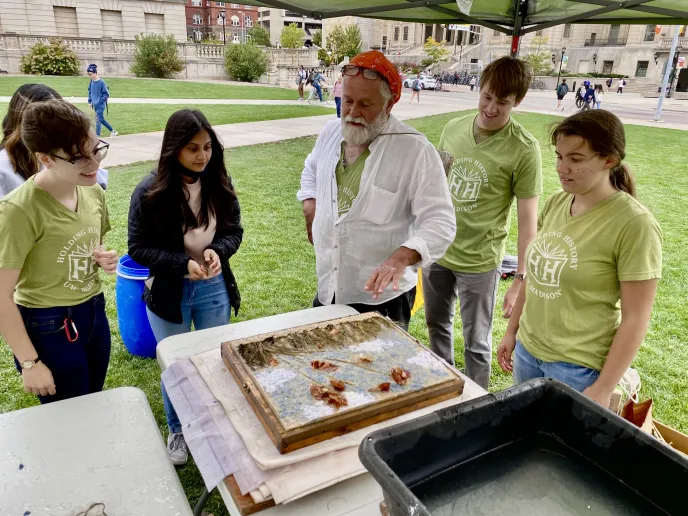
Paper artist/community collaborator Robert Possehl (right center) and "HH Student Curators" admire the artistry of one participant’s handmade paper (left center). Photo courtesy of Joshua Calhoun.
Our first events in University of Wisconsin-Madison’s Special Collections Library were all about rewriting a dramatic script: You walk into an archival library whose climate-controlled vaults are filled with rare, valuable materials and objects. Do you belong here? (Yes!) Should you be wearing white gloves? (No!) Students—not professors, not librarians—are sitting at tables with some of the oldest books you’ve ever seen in person. They’re turning the pages, telling stories about what they have found, and inviting you to talk about what you see, smell, and feel.
Or: You’re walking on Library Mall, a high-traffic area at the edge of campus. A student in a green Holding History t-shirt invites you to try your hand at papermaking—to swirl together water drawn from Lake Mendota with plant fibers from a nearby farm, to draw a screen through this pulpy mixture, and then to pull out a dripping rectangular form that will become a sheet of paper. You perform magic. You transform disparate, raw materials into a new object, and you begin to understand how papermaking has changed the history of information storage and transmission.
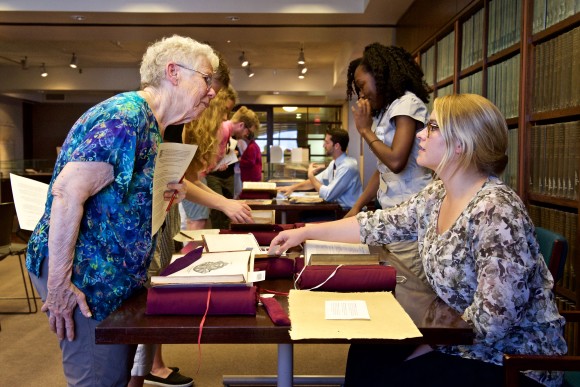
Founded in 2015, Holding History was co-created through an unlikely collaboration between a University of Wisconsin-Madison English professor (Joshua Calhoun) and a Wisconsin School of Business arts administrator (Sarah Marty), who share a passion for old books, intergenerational learning, and sustained mentorship. A public humanities program focused on the weird and wonderful history of media and book arts, Holding History excels at hands-on, community-engaged programming that inspires participants to explore—and reimagine—the ways we record, preserve, and share our stories across time and space.
Simply put: Holding History exists to inspire curiosity and a sense of belonging in public archives. We invite multigenerational audiences—from grade school students to college students to adult learners to senior citizens—to consider how archival materials empower them to tell new kinds of stories about the past and about the future. We help students and community participants gain the skills and confidence to access spaces that sometimes feel exclusive, overwhelming, or even scary.
Our “Student Curators” (the title we use for students who work with our program) have now facilitated over fifty events and hosted 2,500+ visitors for in-person, hands-on activities. Our first in-person events allowed us to facilitate “bookish conversations across generations”: a college student, a middle school student, and a resident from a nearby retirement community deep in conversation over an old book or a papermaking vat.
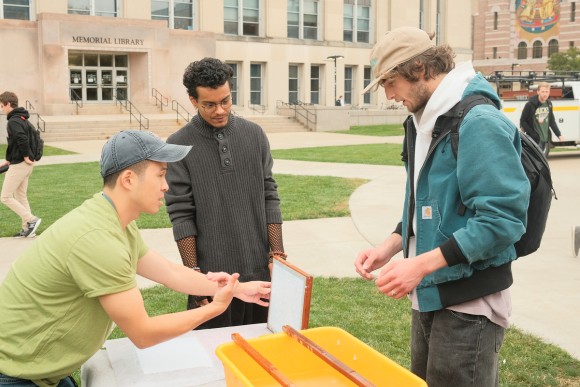
Now, in the wake of COVID-19, we rely on a mission-driven “yes, and” approach that extends the vision of our place-based, in-person programming to include multimodal engagement opportunities. The digital programming we developed in our makeshift home offices during lockdown, The Bookish Blog and The Holding History Podcast, have expanded our project in surprising directions and are fostering new kinds of intergenerational conversations.
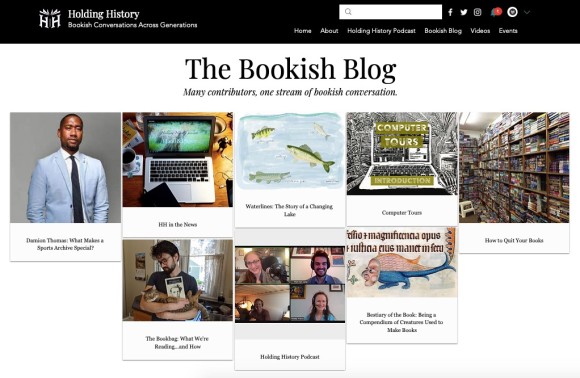
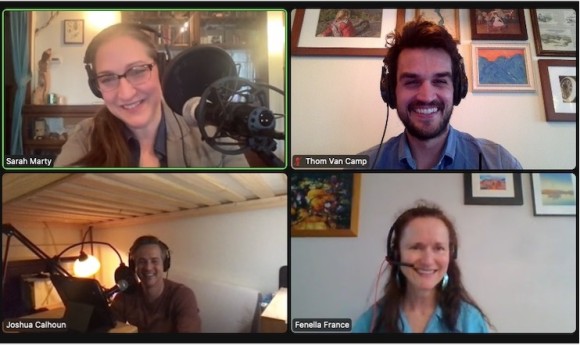
Leading From Beside
Our events in the archives, our papermaking workshops, and our digital publishing platforms rely on experts–program co-directors Marty and Calhoun, archivists, artists, editors, content experts, community collaborators—who serve primarily as mentors and guides. But by design, Holding History events actively flip the “sage on the stage” model so that our undergraduate and graduate students are at the front and center of each experience.
Holding History is committed to a mentoring-driven mission: we lead from beside. Think of a dynamic classroom where, instead of lecturing from the front, the teacher punctuates group work and class discussion with responsive instruction, creating a multidirectional, curiosity-driven dialogue. We coach, mentor, and teach in the early stages, then we ask Student Curators to coordinate and lead events, helping them build skills that are essential to successful public humanities work.
Our graduate students are increasingly invested in humanities-focused career opportunities outside academia, and Holding History is poised to assist with the kinds of publicly engaged scholarship training that academic departments sometimes struggle to provide. For instance, our expansion into digital spaces has fostered a collaborative environment where graduate students learn how to translate their research into blogs and micropodcasts, then learn how to mentor undergraduate students in the same skills.
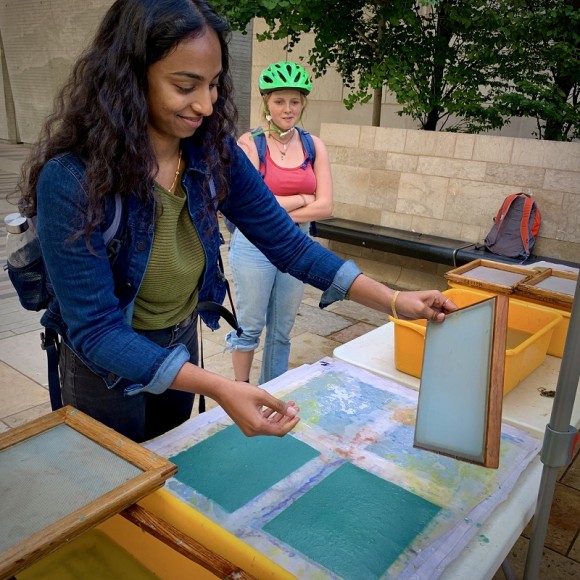
Looking Ahead
As a team of educators, we remain focused on sparking curiosity and enhancing public access to archives, broadly conceived. We’re also increasingly focused on sharing out what has worked for us and compiling resources that others can use in their archives and in their communities. If you are interested in thinking with us, especially about mentoring-driven publicly engaged research, we invite you to reach out to holdinghistory(at)wisc.edu.
Finally, given our collective expertise in and deep commitment to publicly engaged scholarship, we are actively contributing to ongoing conversations about “what counts?” toward success in academia. For too long, and at too many institutions, this important work has been actively discouraged or relegated to areas—like “service”—that have an unequal impact on tenure and promotion decisions. Collaborative, publicly engaged work like ours too often happens on our own time and on our own dime. What’s more, we regularly encounter an inequitable distinction between our shared labor and expertise: because Calhoun is tenured and Marty is contingent faculty, many of our grant opportunities are awarded in Calhoun’s name. Histories of grant funding are also a kind of archive in which one person can be erased even as another is elevated. If our collaborative work has taught us anything, it’s that we have a responsibility to ask questions of our own institutional archives and to imagine new ways to tell new stories with the information we find there.
--
Joshua Calhoun is an Associate Professor of English at the University of Wisconsin-Madison who specializes in Shakespeare, 16th- and 17th-century poetry, and the history of media. As a Faculty Affiliate at the Nelson Institute for Environmental Studies, he also teaches courses in the environmental humanities. In his teaching and research, he gets to explore three things he loves: poetry, old books, and nature. His work has appeared in Adirondack Life, Environmental Philosophy, Outside Magazine, PMLA, and Shakespeare Studies, and he recently published The Nature of the Page: Poetry, Papermaking, and Ecology in Renaissance England (UPenn Press, 2020). Calhoun currently serves on the Advisory Committee, for UW-Madion’s Center for the Humanities and on the Steering Committee for CHCI’s Public Humanities Network.
Website: joshuacalhoun.org
Sarah Marty is Director of the Bolz Center for Arts Administration in the Wisconsin School of Business at University of Wisconsin-Madison, a Faculty Affiliate at UW Division of the Arts, and Producing Artistic Director for Four Seasons Theatre. As an event producer she enjoys collaborating with campus and community partners, whether working with the Director of the University of Wisconsin Marching Band for the UW Varsity Band Spring Concert or welcoming the Dalai Lama to the Overture Center for the Arts. A multi-faceted musician and music educator, she recorded a Swissconsin album of accordion music with her grandmother, a project that was featured in Wisconsin Public Television's Wisconsin Life. Marty currently serves on the Board of Directors for the Overture Center for the Arts.
Website: littlebrownnotebook.com